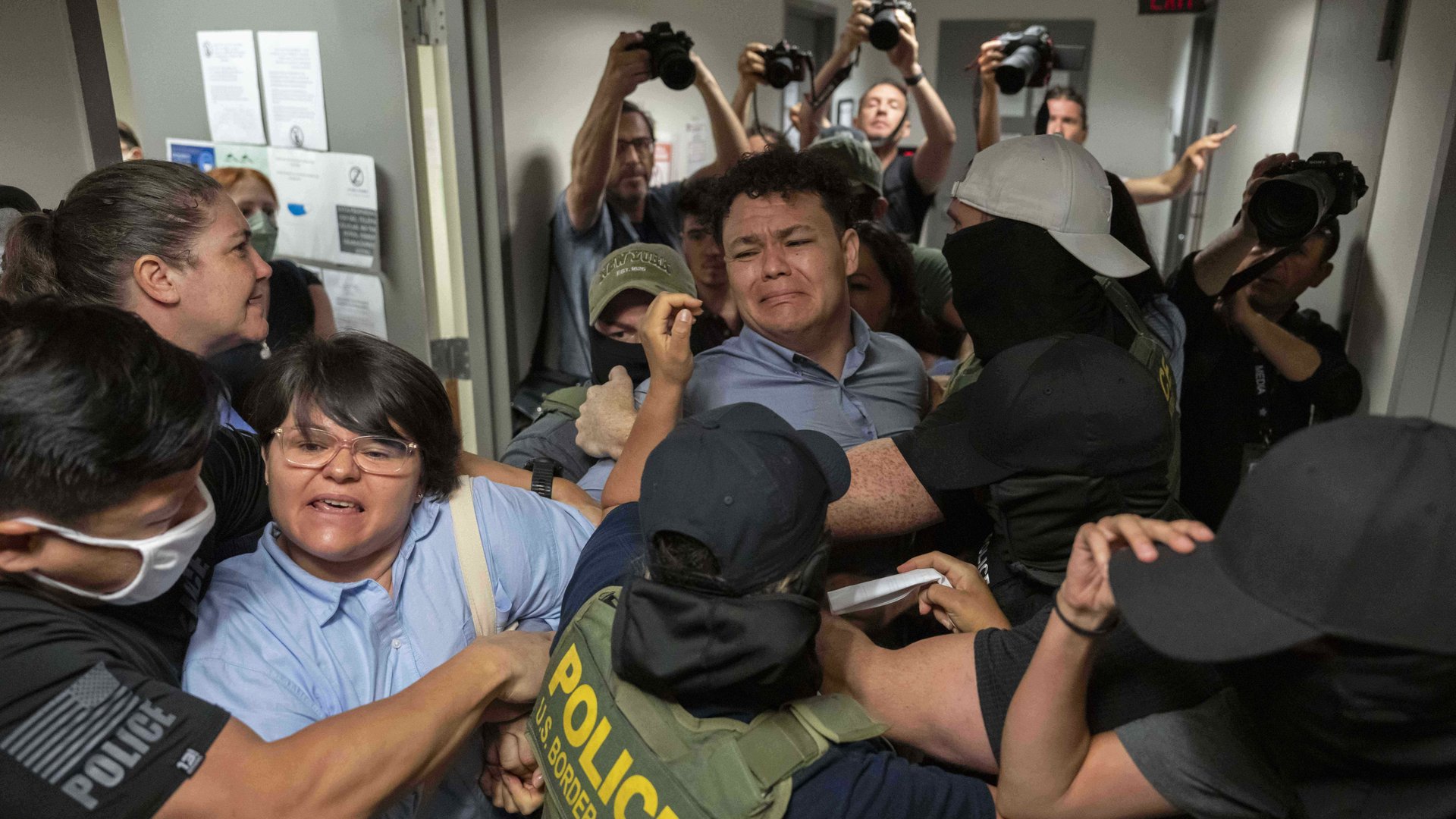Dear Friend of Press Freedom,
It’s the 114th day that Rümeysa Öztürk is facing deportation by the United States government for writing an op-ed it didn’t like, and the 34th day that Mario Guevara has been imprisoned for covering a protest. Read on for more about how the government is stifling speech and reporting—and how to fight back.
Reporting isn’t ‘incitement,’ no matter what the government says
Not content with harassing journalists as they gather the news, the government is also increasingly threatening them with prosecution for reporting it.
At least three times now, the Trump administration has accused journalists who have reported on the government’s immigration crackdown of inciting violence or lawlessness. This raises the possibility that the government will attempt to prosecute journalists for incitement, the crime of instigating others to break the law.
Reporting the news doesn’t even come close to meeting the First Amendment standards for incitement. But the government is counting on its spurious accusations to silence reporting. Read more here.
FPF files complaint against judge who ruled for Trump in frivolous Pulitzer case
Freedom of the Press Foundation (FPF) and Demand Progress filed an ethics complaint against Edward Artau, a Florida judge who was nominated by President Donald Trump to a federal district court. The nomination came after Artau delivered a favorable ruling for Trump in his baseless lawsuit against the Pulitzer Board for not rescinding awards to journalists who were critical of Trump.
“Judges should be safeguarding us against President Trump’s frivolous attacks on the free press, the First Amendment and the rule of law. Instead, Judge Artau seems eager to facilitate Trump’s unconstitutional antics in exchange for a job … Attorney disciplinary commissions need to rise to this moment and not tolerate ethical violations that impact not only individuals before the court but our entire democracy,” said FPF Advocacy Director Seth Stern. Read more here.
Warren introduces presidential library bill
Trump’s presidential library has already received nearly half a billion dollars in known donations, including the settlement from his frivolous lawsuit against ABC. This is a staggering figure considering a library may never be built, and Trump’s CBS shakedown is poised to add to the haul.
This begs the question, is Trump using the ruse of building a library as a vehicle for funneling bribes? It’s possible, and a new bill introduced by Sen. Elizabeth Warren and endorsed by FPF would help put a stop to the potential corruption and make presidential foundations more transparent.
Read more about the bill here.
Gabbard fires FOIA officials after FPF request makes headlines
Director of National Intelligence Tulsi Gabbard has reportedly fired a Freedom of Information Act official who “facilitated” the release of a document to FPF in response to a records request we filed in April.
That document blew apart the Trump administration’s rationale for deporting Venezuelan nationals to El Salvador. The administration had also cited the supposed “fake news” to justify policy changes it claims allow it to investigate journalist-source communications.
FPF’s Daniel Ellsberg Chair on Government Secrecy Lauren Harper breaks down Gabbard’s attempts to stifle lawful disclosures and reporting and how we’re using FOIA to fight back. Read more here.
Fighting authoritarianism with transparency
Speaking of freedom of information, Harper joined NPR’s “1A” this week to discuss how government secrecy undermines the democratic process and what steps we can take to boost transparency.
With overclassification rampant, FOIA offices understaffed and underpowered, and the Trump administration exploiting loopholes to avoid transparency, we’re experiencing “dangerous levels of government secrecy,” Harper said.
But Harper also explained how specific reforms can increase transparency and help preserve our democracy. Listen here.
What we’re reading
ICE lawyers are hiding their names in immigration court (The Intercept). ICE lawyers shouldn’t hide their identities in court, and immigration judges shouldn’t condone the practice.
This disturbing trend must stop immediately.
Senate approves cuts to NPR, PBS, and foreign aid programs (NPR). Clawing back government funding for public media is an attack on every American who relies on it for news and emergency information.
How user-generated videos on social media brought Trump’s immigration crackdown to America’s screens (NBC News). This is exactly why we must defend the First Amendment right to record police in public and laws that protect against online censorship.
It’s not just the Epstein files. The Trump administration is withholding all kinds of public records. (MSNBC). FOIA is “certainly on life support,” said FPF’s Harper.
NJ reporter faces legal battle over police blotter (New Jersey Globe). “Prosecuting journalists for declining to censor themselves is alarming and blatantly unconstitutional, as is ordering the press to unpublish news reports,” explained FPF’s Seth Stern.
How factory farms criminalized journalism to block viral videos of animal cruelty (Rolling Stone). Even as they’re struck down for violating the First Amendment, ag-gag laws that limit the public’s access to information about the agricultural industry are becoming a model for cracking down on reporting on other industries, too.





